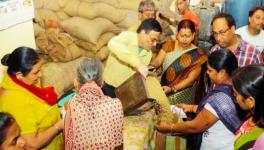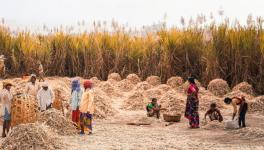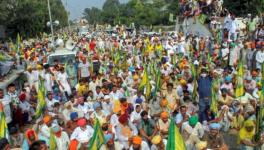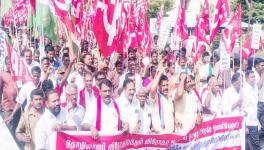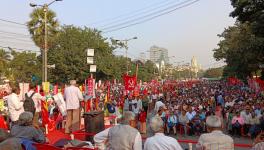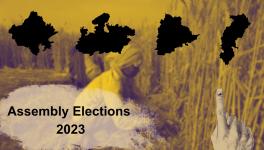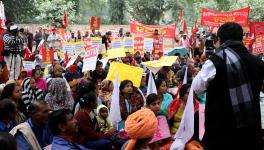Workers’ Mahapadav: Rising Prices Are Snatching Food Away From Families

Image Courtesy: Slide share
One major demand of workers assembling in Delhi at the call of trade unions for a three day maha-padav (protest sit-in) on 9-11 November is controlling price rise. Low wages are continuously getting eroded by price rise, which thus becomes a potent weapon to transfer resources from the poor and exploited to the rich and propertied. As a result, workers, employees, and farmers have to cut down on family spending by buying cheaper food items, staying in poorer dwellings, walking rather than taking a bus or Metro, stopping school for kids or going to a local quack rather than a good doctor. That’s the only way they can counter the rising tide of inflation, unless wages go up. Hence, price rise is a life and death issue for working people.
In the past 3 years, prices of food items have zoomed up steadily. For poorer families, who spend nearly half of their monthly income on food, this spike has been devastating. Prices of meat, fish, eggs, milk and milk products – all sources of protein - have gone up by nearly 25%, while prices of vegetables and fruits have zoomed up by 55%. Prices of pulses too have gone beyond the reach of workers families leading many working people families to stop eating these nutritious protein rich items. In other words the Modi govt.’s failure to control prices is directly responsible for snatching away food from the mouths of workers and their children.
If one looks at a longer time period of a decade, then it is clear that the present Modi govt. is simply continuing the same approach as the previous Congress govt. Their failure to control prices is a common thread. Between 2004 and 2015, wheat prices increased by 117%, rice by 137%, pulses by 123%, vegetables by 350%, milk by 119%, eggs by 124% and sugar by 106%.
Besides this steady rise, the country has seen periodic spikes in prices of some essential items especially, vegetables like onions, tomatoes etc. Lasting for 2-3 months, such spikes rob common people of crores of rupees in a short time, transferring it straight into the treasure chests of big traders. Hoarding of semi-perishable vegetables (like onions) or even tomatoes for a few weeks and manipulating their prices is the method adopted by cartels of big traders operating with impunity.
The govt. has been fooling the people by saying that they will deregulate the agricultural market laws so that farmers can sell produce freely to consumers directly, cutting out middlemen and bringing prices down. This has not happened, except in a very small scale for farmers that stay next to big urban centres. They were in any case doing so earlier also. By removing provisions for registration in mandis, what the govt has done is to simply allow big traders with better resources and deeper pockets to dominate the mandis.
Another way in which the Modi govt. has caused increase in cost of essential services is through its cruel policy of privatisation of medical care, education, insurance, banking etc. all of which has led to higher costs to common people. Doctor’s fees, charges for tests, admission fees etc. are 5-10 times more in unscrupulous private hospitals, according to NSSO studies. Similar is the fate of education.
In order to increase its own revenue, this govt. has maintained high prices of essential fuels like petrol and diesel even though their prices have fallen by 50% in the world. In May 2014, the price of crude oil bought by Indian govt. was $107 per barrel. Three years later, in September 2017 it was half of that at $54 per barrel. By increasing taxes, the govt. has maintained the price of petrol at about Rs.71 per liter and diesel at Rs.58 per liter. The surplus is now lying in govt. treasury while this has caused transport prices to keep rising thereby raising prices of all commodities.
In short, the Modi govt.’s total failure to curb prices – a promise it had made while seeking votes in 2014 – has thrust all working people and employees of the country into the furnace of poverty.
It is ironical that even as consumers of agricultural products like cereals, vegetables or milk are paying more for them, farmers themselves are not getting these benefits. The cost of inputs for agriculture, fertilisers, pesticides, seeds etc have gone up. In addition, the drastic curtailment of subsidies on fuel and fertilisers, deregulation of electricity tariff and various other public utility services is creating a cascading effect on the already rising prices. So they are actually making losses. It has decided to allow FDI in multi brand retail trade on the deceptive pretext that this would bring down prices and provide better returns to the farmers, even when worldwide experience proves otherwise.
So who is getting the benefit? It is mostly big traders and big business. With the blessings of the government, they are pocketing enormous amounts of money which rightfully belonged to working people. They buy cheap from farmers because the farmer needs quick cash and cannot wait or spend to transport his crop to distant consumers. And then they sell at hugely marked up prices to consumers.
One straightforward way in which prices of all essential commodities could have been controlled was a universal public distribution system (PDS). This would not only make available items like cereals, pulses, cooking oil, sugar, kerosene, etc. at cheap prices but could be extended to include things like cheaper notebooks and pens/pencils, for students. This would also bring down prices in the open market as private retailers would not get customers unless they lowered prices.
But contrary to this most reasonable and obvious way forward, the government is dismantling and throttling the public distribution system. By limiting the number of items included in PDS, “targeting” their delivery only to one portion of the population, experimenting with cash transfers which means forcing people to go to open market, putting up obstacles like Aadhaar linking, etc., the govt. is subverting the existing system.
Disclaimer: The views expressed here are the author's personal views, and do not necessarily represent the views of Newsclick.
Get the latest reports & analysis with people's perspective on Protests, movements & deep analytical videos, discussions of the current affairs in your Telegram app. Subscribe to NewsClick's Telegram channel & get Real-Time updates on stories, as they get published on our website.











